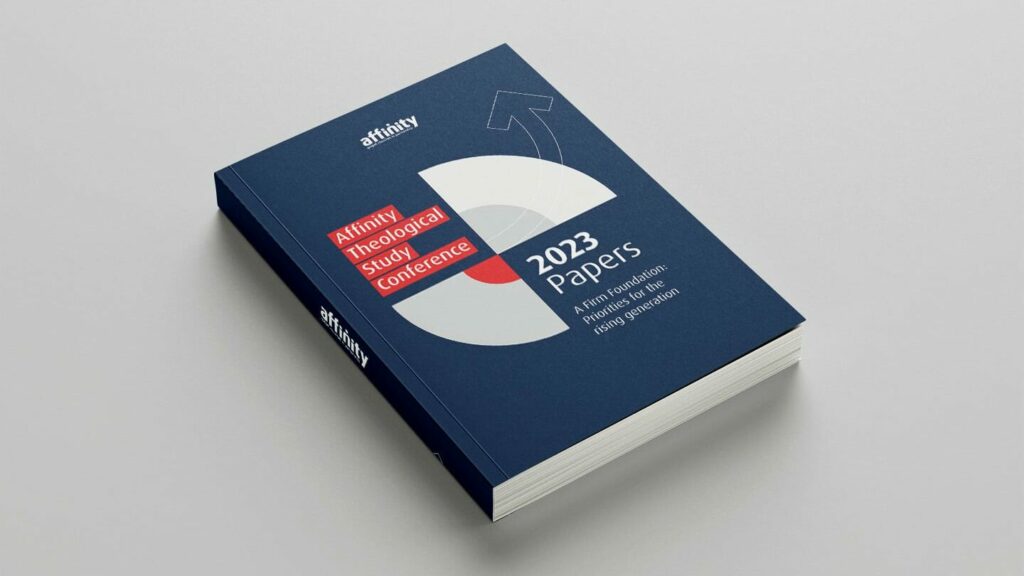Study Conference Papers Introduction
The text below is taken from the Affinity Theological Study Conference book of papers which has been produced and will be distributed exclusively for this year’s event. Book your ticket to attend where you will hear from the writers of each paper and be able to confer with fellow Christians and sharpen each other theologically on culturally relevant topics.

A Firm Foundation: Priorities for the Rising Generation
Introduction to the Papers
Adjectives such as ‘unprecedented’, ‘extraordinary’ and ‘exceptional’ need to be used sparingly, and it has been known for nearly three thousand years that ‘there is nothing new under the sun’ (Eccl 1:9). But in the four years since the Affinity Theological Study Conference last gathered physically in Northampton in March 2019, the national and global landscape has shifted dramatically, with the Covid Pandemic, the war in Ukraine and the cost-of-living crisis deeply affecting the lives of many millions. Of course, two of these three crises are still very much with us, all of them are interlinked in various and complex ways, and their long-term consequences are impossible for us to forecast.
Crises of this magnitude inevitably focus our minds on the whole realm of time: the past, present and future. When we sat down two years ago to consider the theme for the 2023 Conference we were all equally conscious of being burdened with a concern for ‘The Rising Generation’. Whereas past Affinity Theological Study Conferences have focused on subjects with a doctrinal, ethical or ecclesiastical theme, on this occasion we sensed that the topic had to be overwhelmingly pastoral: what must be the essential priorities for believers in the twenty-first century? How could we, in some way, contribute towards laying a ‘Firm Foundation’ for the church in the years and decades which lie ahead?
Such a burden, of course, has the deepest roots in the Scriptures. In Psalm 78:4 Asaph gives it classic expression:
We will not hide them from their children,
but tell to the coming generation
the glorious deeds of the LORD, and his might,
and the wonders that he has done.
(Psalm 78:4)
Once we had settled on this theme, it seemed comparatively straightforward for us to agree on how it should be worked out in detail. We very much sense that the Lord led us to five contributors who grasped the need of the hour, and who applied their minds and experiences to the task at hand, with the result you now hold in your hand: five Papers of outstanding quality and depth; five Papers which I trust you will turn to again and again in the course of Christian life and ministry.
In Paper 1, Peter Sanlon analyses what has perhaps become the main presenting issue of the day for western culture, that of Identity. This question penetrates a good deal deeper than the vexed matters of gender, sexuality and ethnicity; essentially it comes down to a clear and binary choice: whom do we love, worship and glorify, self or God? The quest for self-realization and self-fulfilment may take many forms, from pornography to conspiracy theories to a culture of ‘victimhood’, but each of these are diverse expressions of the same fundamental motivation – to worship and serve the creature rather than the Creator, who is blessed forever – Amen! (Rom 1:25). Against all this, the next generation is summoned to walk ‘The Road Less Travelled’, where we gather under the cross of Jesus Christ.
In Paper 2, Robin Gray opens up the key question of Genuine Conversion. He does so by delving deep into the mind of Jonathan Edwards (1703-58) on the subject, and in particular, his Religious Affections, which were the mature fruit of Edwards’ deep reflection, years after many striking and ‘surprising’ events in his own ministry. Few minds have thought as hard and as deeply as Edwards about the subject of conversion, but fewer by far have written about the subject as incisively as he did. Whilst many other scholars and pastors have very helpfully brought Edwards’ thinking to the attention of the contemporary church, this Paper, as it succinctly summarises Edwards’ main observations, will undoubtedly prove to be a precious additional resource in the hands of twenty-first century pastors, not only in evaluating professed conversions in their own churches, but in keeping a close watch on their own souls (1 Tim 4:16).
In Paper 3 Phil Heaps takes us to the realm of Sanctification and Consistent Godly Living. By leading us to the Sermon on the Mount and to the Beatitudes in particular (Matt 5:3-12), Phil demonstrates, very convincingly, that this ‘Jesus Seminar’ is unparalleled as ‘A Discipleship Course for the 2020s’. Here is material which is intensely practical and yet is addressed directly to the human heart; here is a masterclass for the formation of Christian character but one which is to be worked out in the corporate context of the church. The Lord Jesus Christ – and the Beatitudes are, supremely, a delineation of Christ’s own spiritual character – calls his people to a radical obedience which is motivated by humility, ‘poverty of spirit’ (Matt 5:3) but which is the only path to the growth for which God looks, growth in holiness.
In Paper 4 Mark Thomas takes a panoramic view of the work of Pastoring the Twenty-First Century Church. He begins with the tremendous, transcendental reality that God Himself is the Pastor of his people (Ps 23:1, 80:1), and then fleshes out in detail how the pastoral office of the undershepherd is described in Scripture. Throughout, the calling of the pastor is described and illustrated with many examples in the Reformation and Puritan tradition – not least from the ‘three Bs’ of Bucer, Baxter and Bridges. The climactic feature of this Paper is its recognition and analysis of contemporary culture and how it impinges on young people attached to churches. Whilst there are timeless issues and considerations that every pastor and church must face, there are some that are peculiar to today, and pastors are urged to face up to these – they include anxiety, exhaustion, ‘influences’ and, as in Paper 1, the whole question of ‘identity’.
Finally, in Paper 5, Patrick Fung addresses the theme of Faithfulness amidst Trial and Persecution, a subject which had to be tackled in a conference of this kind. The Paper begins with an in-depth treatment of the narrative of persecution in Luke-Acts, showing how it was first directed against Jesus and then against his disciples. The key consideration is not simply that persecution happened, but that the early church needed to know how to respond to it. In the next section of the Paper, Patrick describes in detail the Boxer Uprising in China in 1900 and in particular the response of the church, exemplified in the approach of Dixon Edward Hoste (1861-1946), Hudson Taylor’s successor as leader of the China Inland Mission. Hoste’s approach was humble, gracious, visionary and deeply instructive for the church today. Following this, Patrick concludes with a survey of the state of anti-Christian persecution in the world today, both ‘east’ and ‘west’, and calls us to prayerful, patient, self-denying witness.
These five Papers are indeed a treasure. Make sure that you read them, and having done so, commend them to a member of the ‘Rising Generation’. Perhaps you are a member of that ‘Rising Generation’ yourself! In which case, hold fast to the great lessons you discover here, and make them as widely known and practised as you can.
May the Lord use this work to the praise of his eternal glory, and the building of his kingdom throughout the world.
Paul Yeulett, Chairman of the Affinity Theological Study Conference

Related articles
Stay connected with our monthly update
Sign up to receive the latest news from Affinity and our members, delivered straight to your inbox once a month.



